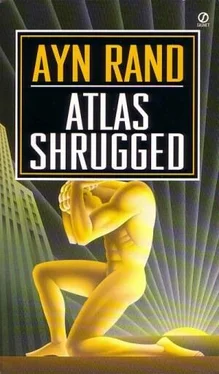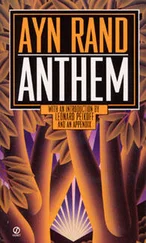"I am pleased that you chose this occasion as the exception." He did not add "Miss Taggart," but it sounded as if he had.
The formality of his manner was so unexpected that she was unable to adjust to it. "I wanted to celebrate," she said.
"To celebrate my wedding anniversary?"
"Oh, is it your wedding anniversary? I didn't know. My congratulations, Hank."
"What did you wish to celebrate?"
"I thought I'd permit myself a rest. A celebration of my own—in your honor and mine."
"For what reason?"
She was thinking of the new track on the rocky grades of the Colorado mountains, growing slowly toward the distant goal of the Wyatt oil fields. She was seeing the greenish-blue glow of the rails on the frozen ground, among the dried weeds, the naked boulders, the rotting shanties of half-starved settlements.
"In honor of the first sixty miles of Rearden Metal track," she answered.
"I appreciate it." The tone of his voice was the one that would have been proper if he had said, "I've never heard of it."
She found nothing else to say. She felt as if she were speaking to a stranger.
"Why, Miss Taggart!" a cheerful voice broke their silence. "Now this is what I mean when I say that Hank Rearden can achieve any miracle!"
A businessman whom they knew had approached, smiling at her in delighted astonishment. The three of them had often held emergency conferences about freight rates and steel deliveries. Now he looked at her, his face an open comment on the change in her appearance, the change, she thought, which Rearden had not noticed.
She laughed, answering the man's greeting, giving herself no time to recognize the unexpected stab of disappointment, the unadmitted thought that she wished she had seen this look on Rearden's face, instead. She exchanged a few sentences with the man. When she glanced around, Rearden was gone.
"So that is your famous sister?" said Balph Eubank to James Taggart, looking at Dagny across the room.
"I was not aware that my sister was famous," said Taggart, a faint bite in his voice.
"But, my good man, she's an unusual phenomenon in the field of economics, so you must expect people to talk about her. Your sister is a symptom of the illness of our century. A decadent product of the machine age. Machines have destroyed man's humanity, taken him away from the soil, robbed him of his natural arts, killed his soul and turned him into an insensitive robot. There's an example of it—a woman who runs a railroad, instead of practicing the beautiful craft of the handloom and bearing children."
Rearden moved among the guests, trying not to be trapped into conversation. He looked at the room; he saw no one he wished to approach.
"Say, Hank Rearden, you're not such a bad fellow at all when seen close up in the lion's own den. You ought to give us a press conference once in a while, you'd win us over."
Rearden turned and looked at the speaker incredulously. It was a young newspaperman of the seedier sort, who worked on a radical tabloid. The offensive familiarity of his manner seemed to imply that he chose to be rude to Rearden because he knew that Rearden should never have permitted himself to associate with a man of his kind.
Rearden would not have allowed him inside the mills; but the man was Lillian's guest; he controlled himself; he asked dryly, "What do you want?"
"You're not so bad. You've got talent. Technological talent. But, of course, I don't agree with you about Rearden Metal."
"I haven't asked you to agree."
"Well, Bertram Scudder said that your policy—" the man started belligerently, pointing toward the bar, but stopped, as if he had slid farther than he intended.
Rearden looked at the untidy figure slouched against the bar. Lillian had introduced them, but he had paid no attention to the name. He turned sharply and walked off, in a manner that forbade the young bum to tag him.
Lillian glanced up at his face, when Rearden approached her in the midst of a group, and, without a word, stepped aside where they could not be heard.
"Is that Scudder of The Future?" he asked, pointing.
"Why, yes."
He looked at her silently, unable to begin to believe it, unable to find the lead of a thought with which to begin to understand. Her eyes were watching him.
"How could you invite him here?" he asked.
"Now, Henry, don't let's be ridiculous. You don't want to be narrow minded, do you? You must learn to tolerate the opinions of others and respect their right of free speech."
"In my house?"
"Oh, don't be stuffy!"
He did not speak, because his consciousness was held, not by coherent statements, but by two pictures that seemed to glare at him insistently.
He saw the article, "The Octopus," by Bertram Scudder, which was not an expression of ideas, but a bucket of slime emptied in public—an article that did not contain a single fact, not even an invented one, but poured a stream of sneers and adjectives in which nothing was clear except the filthy malice of denouncing without considering proof necessary. And he saw the lines of Lillian's profile, the proud purity which he had sought in marrying her.
When he noticed her again, he realized that the vision of her profile was in his own mind, because she was turned to him full-face, watching him. In the sudden instant of returning to reality, he thought that what he saw in her eyes was enjoyment. But in the next instant he reminded himself that he was sane and that this was not possible.
"It's the first time you've invited that . . ." he used an obscene word with unemotional precision, "to my house. It's the last."
"How dare you use such—"
"Don't argue, Lillian. If you do, I'll throw him out right now."
He gave her a moment to answer, to object, to scream at him if she wished. She remained silent, not looking at him, only her smooth cheeks seemed faintly drawn inward, as if deflated.
Moving blindly away through the coils of lights, voices and perfume, he felt a cold touch of dread. He knew that he should think of Lillian and find the answer to the riddle of her character, because this was a revelation which he could not ignore; but he did not think of her—and he felt the dread because he knew that the answer had ceased to matter to him long ago.
The flood of weariness was starting to rise again. He felt as if he could almost see it in thickening waves; it was not within him, but outside, spreading through the room. For an instant, he felt as if he were alone, lost in a gray desert, needing help and knowing that no help would come, He stopped short. In the lighted doorway, the length of the room between them, he saw the tall, arrogant figure of a man who had paused for a moment before entering. He had never met the man, but of all the notorious faces that cluttered the pages of newspapers, this was the one he despised. It was Francisco d'Anconia.
Rearden had never given much thought to men like Bertram Scudder.
But with every hour of his life, with the strain and the pride of every moment when his muscles or his mind had ached from effort, with every step he had taken to rise out of the mines of Minnesota and to turn his effort into gold, with all of his profound respect for money and for its meaning, he despised the squanderer who did not know how to deserve the great gift of inherited wealth. There, he thought, was the most contemptible representative of the species.
He saw Francisco d'Anconia enter, bow to Lillian, then walk into the crowd as if he owned the room which he had never entered before.
Heads turned to watch him, as if he pulled them on strings in his wake.
Approaching Lillian once more, Rearden said without anger, the contempt becoming amusement in his voice, "I didn't know you knew that one."
"I've met him at a few parties."
Читать дальше










